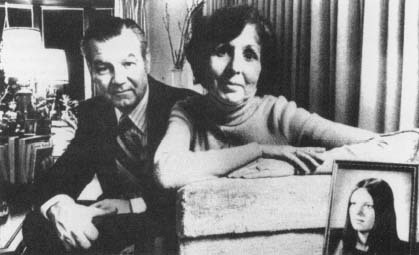In the Matter of Karen Ann Quinlan: 1975
Accepted Standards Vs. Right To Die
Karen Quinlan's neurologist, Dr. Robert Morse, was the first person to testify. He acknowledged that there was virtually no chance that Quinlan would resume a "cognitive, functional existence." However, he said he saw no medical precedent for disconnecting Quinlan from her respirator and said he would not obey a court order to do so. Dr. Arshad Jarved, Quinlan's pulmonary internist, also had refused to act on Joseph Quinlan's request; he also testified that accepted standards of medical practice did not permit the removal of the respirator.
The Quinlans' attorney, Paul Armstrong, argued that the rights of privacy and religious freedom included a right to die. He explained his clients' religious view that the respirator was keeping their daughter from God and heaven: "[T]he earthly phase of Karen Quinlan's life has drawn to a close and she should not be held back from enjoyment of a better, more perfect life."
Karen Quinlan's court-appointed guardian, Daniel Coburn, saw the matter differently: "This isn't a terminal cancer case where someone is going to die. Where there is hope, you cannot just extinguish a life because it becomes an eyesore."
The following day, Armstrong called as an expert witness Dr. Julius Korein, a neurologist at Bellevue hospital and New York University Medical School. He described Karen Quinlan—by now weighing only 75 pounds—as having signs of severe higher brain disfunction. He testified that she had only "stereotyped" responses, such as blinking or rolling her eyes, to stimuli. "This pattern of reactions," he said, "could, in no way, in my opinion, be related to conscious activity." Dr. Korein also described "an accepted but not spoken-of law," according to which physicians withheld aggressive, invasive treatment from patients who were, for example, "riddled with cancer and in pain." He added: "That is the unwritten law and one of the purposes of this trial is to make it the written law."
Then an emotional Joseph Quinlan then took the stand and asked the court: "Take her from the machine and the tubes and let her pass into the hands of the Lord."
 Julia and Joseph Quinlan with a photo of their daughter Karen Ann.
Julia and Joseph Quinlan with a photo of their daughter Karen Ann.
On the third day, Karen's mother, Julia Ann Quinlan, testified that Karen had made her wishes known on three occasions, saying, "Mommy, please don't ever let them keep me alive by extraordinary means." The statements were made, Mrs. Quinlan said, when two of Karen's friends and an aunt finally died after long battles with cancer. "Karen loved life, and if there was any way that she could not live life to the fullest she wanted to be able to die in her own surroundings, instead of being kept alive for months or years. I visit her every day and as I see her in her present condition I know in my heart as a mother she would not want to be there. We discussed this many times."
Although the defense lawyers objected to such hearsay evidence, Judge Robert Muir, Jr., permitted Karen's sister and one of her friends to give similar testimony. Judge Muir declined, however, to permit a Roman Catholic priest to give expert testimony regarding the church's view of extraordinary medical intervention. "It is not my role to weigh the merits of what a person believes," he explained. "It is enough that I am convinced he has these beliefs."
On October 23, three neurologists—Dr. Fred Plum of the American Association of Neurologists, Dr. Sidney Diamond of Mount Sinai Hospital, and Dr. Stuart Cook of the New Jersey College of Medicine and Dentistry—gave expert medical testimony. The three concurred that Karen Quinlan's lack of higher brain function was "irreversible" and "irreparable." However, all three agreed that Quinlan was alive by both legal and medical definitions and that it would be improper to remove the respirator.
Additional topics
Law Library - American Law and Legal InformationNotable Trials and Court Cases - 1973 to 1980In the Matter of Karen Ann Quinlan: 1975 - Accepted Standards Vs. Right To Die, Decision Is Appealed, Suggestions For Further Reading